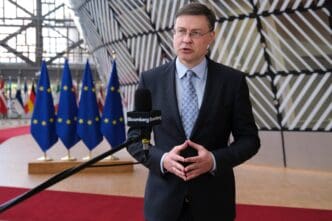Executive Summary
- G7 finance ministers agreed to a united and coordinated response to China’s expanded export controls on rare earths.
- The G7 committed to diversifying global suppliers for critical minerals to reduce reliance on any single nation.
- Concerns were raised over China’s expanded export controls on rare earths, as China dominates 80-90% of the world’s supply.
The Story So Far
- The G7’s coordinated response to China’s rare earth export controls is driven by China’s near-monopoly, controlling 80-90% of the global supply, and its recent expansion of these controls to a broader scope of minerals with extraterritorial provisions. This situation has heightened concerns among G7 partners, prompting them to seek both immediate solutions and long-term diversification of global supply chains to reduce reliance on any single nation for these critical minerals essential for advanced technologies.
Why This Matters
- The G7’s coordinated response to China’s expanded export controls on rare earths highlights the escalating geopolitical significance of these critical minerals, signaling a concerted effort by major economies to diversify global supply chains and reduce their reliance on any single nation. This strategic move aims to mitigate future supply disruptions and build resilience for industries dependent on advanced technologies, potentially accelerating investment in new rare earth mining and processing capabilities outside of China.
Who Thinks What?
- G7 finance ministers and European Economic Commissioner Valdis Dombrovskis are concerned about China’s expanded export controls on rare earths, highlighting their broad scope and extraterritorial provisions.
- The G7 has agreed to maintain a united front, coordinate their immediate response to China’s controls, and commit to diversifying global suppliers for critical minerals to enhance supply chain resilience.
Group of Seven (G7) finance ministers have agreed to maintain a united front and coordinate their immediate response to China’s export controls on rare earths. The decision, announced by European Economic Commissioner Valdis Dombrovskis on Thursday, also includes a commitment to diversify global suppliers for these critical minerals. Dombrovskis made the remarks on the sidelines of the International Monetary Fund meetings in Washington.
G7 Concerns Over Chinese Export Controls
Dombrovskis highlighted shared concerns among G7 partners regarding China’s expanded export controls. These controls reportedly cover a broader scope of minerals and extend across the value chain, including “extensive extraterritorial provisions.” China currently dominates the global supply chains for rare earths, accounting for 80-90% of the world’s supply.
The immediate strategy involves coordinating engagement with Chinese counterparts to seek short-term solutions. Beyond immediate measures, the G7 will continue its ongoing work to enhance the diversification and resilience of global supply chains, a long-standing objective.
Global Impact of Supply Chain Resilience
The G7’s coordinated efforts underscore the increasing geopolitical significance of critical mineral supply chains. Diversifying sources for rare earths aims to reduce reliance on any single nation, mitigating risks associated with potential supply disruptions. This strategic focus reflects broader international efforts to secure essential resources for advanced technologies and industries.
The discussions at the IMF meetings reflect a concerted international push to address vulnerabilities in global trade and resource access. The emphasis on coordination and diversification is central to ensuring economic stability and technological advancement in a complex geopolitical landscape.








